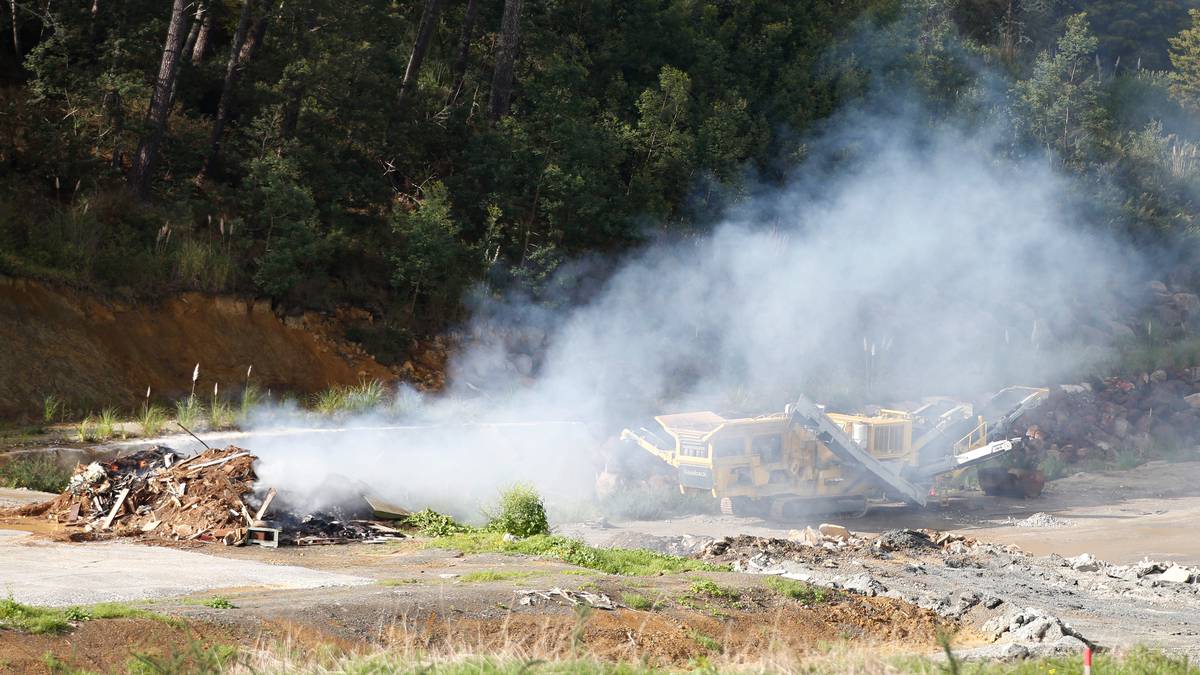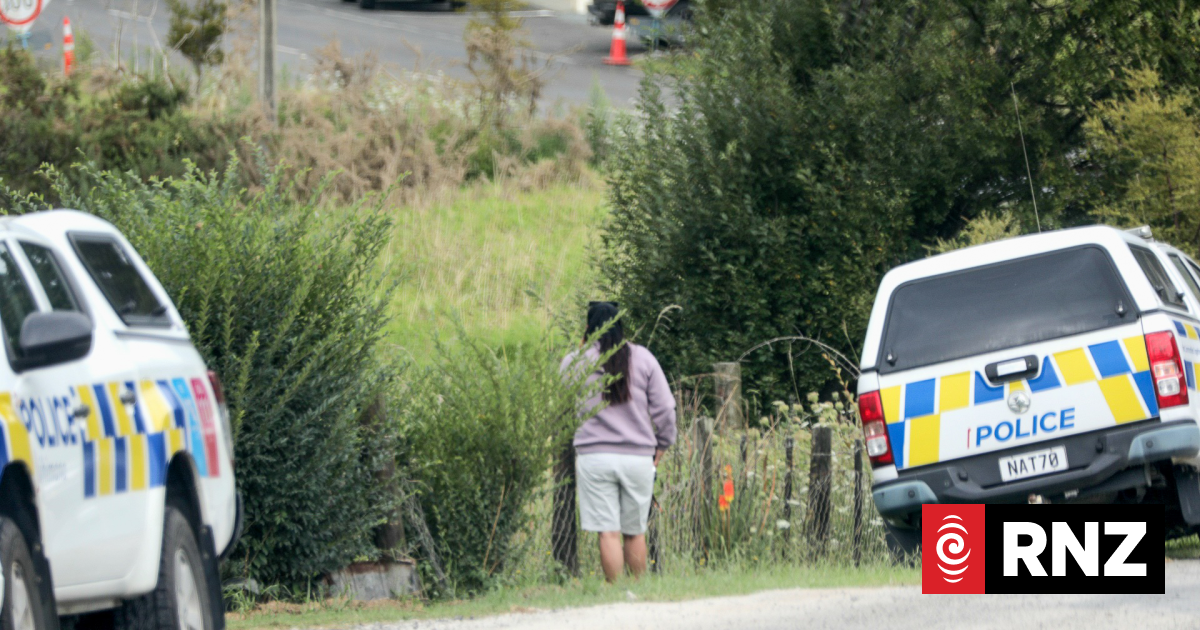This illegal rubbish fire on June 3, 2020, has cost former Whangārei Mayor Stan Semenoff about $15,500. Photo / NZME
Former Whangārei mayor Stan Semenoff has been fined more than $15,500 and refused a discharge without conviction for permitting a large illegal rubbish fire at one of his business properties.
The fire on the morning of June 3, 2020, was at an industrial site owned by Semenoff and the Northland Trustee Limited on South End Ave, Raumanga.
A fire officer who attended said he saw black smoke billowing from up to five kilometres away and once at the site found a two-metre-high burning mound of rubbish including plastics, metal cable, PVC piping, iron, fenceposts, plywood, and tyres.
Enforcement officers from the Northland Regional Council accepted Semenoff was not directly responsible for the fire, which was lit in his absence by another employee – one of two managing his business for him while he recovered from a series of strokes.
But as managing director of the Semenoff Group he was personally liable for breaches of the Resource Management Act (RMA) that the fire caused.
The Council – on which he once represented ratepayers – charged him with discharging or permitting the discharge of contaminants into the air from an industrial or trade premises by the burning of waste; and with discharging or permitting the discharge of contaminants into the air by burning tyres in breach of an RMA national environmental standard.
Each charge is punishable by up to two years in jail or a $300,000 fine.
Environment Court Judge Prudence Steven found Semenoff guilty earlier this year and in a remote hearing on Thursday fined him $15,520 and refused to discharge him without conviction.
Ninety per cent of the fine will go to the Northland Regional Council. Semenoff must also pay solicitors’ costs and court costs ($130).
At trial, counsel Matthew Atkinson argued that as former deputy chair of the Northland Regional Council, Semenoff knew the rules about lighting fires and would not break them.
Tyres from his businesses were routinely taken to the local waste management plant and processes were also in place for all other waste. Burning rubbish was not part of his business practice.
While Semenoff was back at work after his illness, he was still relying on his accountant Carlo Lang and senior workshop manager Brett Borck to make business decisions.
Borck and Lang each gave evidence in support of Semenoff, confirming it was their decision to light the fire as a way of getting rid of rubbish that had been dumped at the previously vacant site by members of the public over the past two years.
Prosecutor Karenza De Silva said there had been three previous incidents of unlawful burning at Semenoff Group sites – in 200, 2009, and 2014 – leading to enforcement action. Semenoff was therefore on notice his staff did not know the rules for outdoor burning and had not taken any steps to inform them.
Judge Steven said it would have been “relatively straight forward” for Semenoff to have done so. Failure to take those steps was a factor in the resulting fire.
“Where staff were not aware of the Council rules for burning, in the absence of Mr Semenoff to micro-manage staff involved in the clearing of the site on the day of the burning, and in circumstances where there were no other plans for a method of lawful disposal, the burning of this accumulated rubbish was reasonably foreseeable,” the judge said.
“Mr Semenoff’s error was that he placed too much reliance on his ability to be on site at all times to oversee day-to-day operations, which in his opinion was a sufficient and appropriate means of ensuring compliance with environmental obligations” Steven said.
Semenoff’s attitude was “risky” and “irresponsible” given he had about 120 employees and given the past incidents of unlawful burning, the judge said.
She noted it was only after her guilty verdict – two years after the fire – that Semenoff finally schooled his staff on the Regional Council rules about outdoor fires.
De Silva submitted the starting point for the fine should be $35,000 and pointed to the need to deter this kind of offending, which she said happened all too often in this region.
Steven acknowledged the Council’s despair over the issue but put the gravity of Semenoff’s offence at a lower level than the prosecutor.
In setting the level of the fine, the judge took into account that Semenoff was at least aware of the Regional Council rules on outdoor burning and had arrangements in place for the collection and disposal of the Group’s waste items such that burning would not be required; the fire involved rubbish that was fly-tipped by the public at the previously vacant site and the site was not one used for the Group’s primary business activities; the fire would not have occurred if Semenoff had not been incapacitated by the strokes he suffered; that Semenoff had now made his staff aware of the Regional Council’s rules on outdoor burning and had fenced the site to avoid further rubbish dumping by the public.
She accepted the fire was relatively small compared to other cases of its type and had only been burning for a short while before it was extinguished. There were no long-term environmental effects.
The judge acknowledged Semenoff’s contribution to and standing in the community and his lack of previous convictions but said it only warranted a discount of three per cent to the $16,000 starting point of the fine.
The application for discharge without conviction was on the grounds that the stigma of a conviction on Semenoff’s reputation and standing within the community would be out of all proportion to the offending, particularly given he did not light or consciously permit the fire.
But Steven disagreed, saying the disproportionality requirement was not made out.
She acknowledged Semenoff’s contributions to his community but said his fear of his reputation being damaged was not a consequence she could take into account.
There would always be a stigma attached to conviction, which might be felt quite strongly by those with local standing. But it must be borne in mind that convictions for RMA offending did not have overtones of dishonesty, immorality or violence; they are for regulatory offences, the judge said.
“On this occasion, Mr Semenoff has lapsed and that is that,” Steven said.
/cloudfront-ap-southeast-2.images.arcpublishing.com/nzme/AKRAHJNUUFMC7VR4I6CHZVRYNE.jpg)
/cloudfront-ap-southeast-2.images.arcpublishing.com/nzme/GVTUITHPWVKFU7LYQQGVZ4322M.jpg)
/cloudfront-ap-southeast-2.images.arcpublishing.com/nzme/CU5UYZLMKC5RUXEXKBQIISNPVY.jpg)




